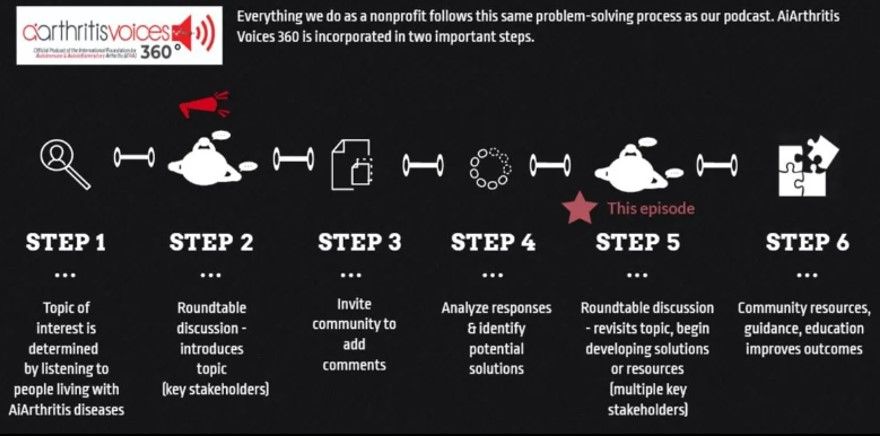Introduction
[00:01:55] Tiffany: Hello and welcome to AiArthritis Voices 360. This is the official talk show for the International Foundation for Autoimmune Autoinflammatory Arthritis or AiArthritis for short. My name is Tiffany Westrich-Robertson. I'm the CEO of the organization, but I am also the person living with our diseases. My primary diagnosis is non-radiographic axial spondyloarthritis, and many of our leaders are also affected by our diseases, and that's why we say we don't represent the patient voice.
We are the patient voice, and there's a lot of projects, including this talk show that we do, that are based on the patient voice, on leading efforts to help share resources, create programs and mentor people who want to be more conscious about their diseases and how to manage them and that's really what this episode is about today.
Today's Topic: Comorbidities
[00:01:50] So we're gonna talk a little bit about comorbidities. There's a lot of layers to comorbidities, which I guess you, they're, they're kinda layered in themselves. They're additional so they are layered but it's a, it's a complex discussion cause there's a lot of ways we can have comorbidities and it's very important if you're living with these diseases or you know somebody or loved one your family member, coworker, whomever that is in your life, who's living with one to understand that these really are complex, especially cause often you look at people like me and say wow, well you look fine, you know, you don't look sick.
Well, a lot of this is happening inside. Now, that's partially true if you are not visible, meaning you may not have swelling. Sometimes you might have swelling. Sometimes you might have rashes. Those, sometimes that helps people actually understand oh something's going on, but a lot of times it's invisible.
AiArthritis Diseases & Comorbidities
[00:02:54] So saying that, the comorbidity that we're going to focus on today is about organ involvement. Now you might say, organ involvement? Oh, I thought this was just Arthritis? Nope. So AiArthritis focuses on just the auto meaning autoimmune or autoinflammatory, different sizes, different parts of the immune system, those diseases that include most often, more often than not, an inflammatory arthritis along with them. So that is where it's AiArthritis, autoimmune arthritis, autoinflammatory arthritis, and those are only about 20 some odd diseases. The auto diseases are like a hundred and who knows, 20 plus. So we really narrow down the diseases to just those that are most like each other with that arthritic component as sort of the connecting feature.
So in saying that these are systemic full body diseases. So we have the arthritic component, but then what is happening in the auto? Well in addition to symptoms like fatigue, and brain fog, and myalgia, and some things that no matter what your diagnosis is, you tend to have, the auto part is what, what also is affecting your organs. Potentially. Some of the diseases that fall under our, our umbrella are more likely than others to involve organs as part of the natural disease course.
So for example, Sjogren's syndrome, dry eye, eye organ, Psoriatic Arthritis, skin, organ, right? So that is one element of organ involvement. When we talk about heart, lungs, kidneys, those are also impacted by our diseases in a variety of ways, and that's where we're gonna zero in a little bit today. We're gonna put this topic on the table. We're gonna help explain sort of where the organ involvement comes into our diseases.
So we have some general basic knowledge where I'm gonna just briefly mentioned some things when it's not disease related, but it's a comorbidity of another condition that has developed that involves like your heart, for example, and you're living alongside that as a comorbidity, not it didn't happen straight from the disease as a symptom of that disease itself.
And then we're going to branch off after this episode into many conversations based on largely on what we learn as we take off this week to Milan, Italy for one of the largest rheumatology research conferences annually, which AiArthritis always attends and we're attending, and some of the sessions are specifically about comorbidities in our diseases. So we're going to introduce you to the topic today to get you thinking about it and then we're going to attend the sessions that talk about it and we're gonna talk more about it and how hopefully answer some of your questions and provide you with a lot of great information to expand this conversation and provide you with great resources for managing your condition and things for you to be able to think about as you move forward with your journey with AiArthritis diseases.
Go with Us to Scientific Conferences
[00:06:40] Now real quick. “Go with Us” for free. So by the time you're listening to this, we will be wrapping up the week, but you can still sign up to get recordings, to get insider information and any debriefs patient led debriefs that we do, because that's when all of the conversations will continue. So you can do that at AiArthritis.org/conferences.
So depending on when you listen to this as well, if you listen to this a year from now, you can still go to that exact same link and whatever the next conference is in line, there will always be a link to sign up to go because you could always go with us and be part of learning along with us and asking us questions and letting us help you better navigate your health journey.
Alright. So what are these topics that we're gonna put on the table today? Oh, I should also say I'm alone today. Usually we have at least another co-host with us, but we really wanted to do something fun different, not like all of our shows are, of course fun. We wanna do something different and really put the 360it into the talk show. And that means that after we put these topics today on the table, we're gonna spin off into these many different conversations, largely based on what we learn when we go to the Eu
But forever now, we can spin off and continue these conversations and you can ask us questions and then place some those questions. We build out more conversations, and that's how we learn together at our organization and help you worldwide as well.
Organs & Comorbidities
[00:8:22] So again, comorbidity. It's a very complex word because you could have like a dual diagnosis where it's, we, you know, we say, oh, I have axial spondyloarthritis and I have Sjogren's syndrome something along that line. Maybe rheumatoid arthritis, lupus. So there's dual diagnosis. That happens a lot. Then we have comorbidities that involve additional organs like heart disease for example. So that is a second type of comorbidity. And those are, those are what we're gonna talk about today, specifically around the organs and we're going to differentiate the two so that you are more aware of, oh, this can happen with my natural disease progression, or this could happen as an additional condition based on uncontrolled inflammation.
So there's kind of two levels to our complex comorbidities, and that's what I'd like to clarify today and at least get you thinking about the bigger picture of what we need to consider when we're navigating our health. So some typical organ involvement, gastrointestinal, some diseases like Crohn's disease, even to the spondyloarthritis what I have often include some type of gastrointestinal symptoms. So those could, are often contributed in some way, even if they're not one of the more common symptoms.
So even rheumatoid arthritis, you'll see a lot of patients having gastrointestinal. So that one could be considered a comorbidity that is on its own. It also, depending on which diagnosis you have, it could be all right that often crosses over or is actually a symptom. So just understanding where you fall in that spectrum could be very important.
You could be having these symptoms and saying, I didn't even know that that could be associated with my disease. Another one that we're going to put on the table is heart and lungs and kidneys.
Ig-G4 Related Diseases
[00:10:46] And I also wanted to mention something that we've not talked about really before. It's a fairly newer disease called IgG4 or IgG4 related disease. I see RD after it quite often. A disease that really came forth around 2015 and it very organ heavy. It's, it, it, it affects, it's like tumors in the organs and the reason we're going to put it on the table today as a potential comorbidity is because it has often been associated with Sjogren's syndrome. It's been associated with rheumatoid arthritis, with lupus, with sarcoidosis, with still's disease.
So many of the diseases that fall under our umbrella, it really is worth us as an organization exploring is there like more of us that have this than we know is that part of what we think is a natural organ involvement in our disease. So we wanna help kind of untangle that and investigate more. And that is also going to be a session that we're going to be attending when we go to EULAR and moving forward at the Maryland College of Rheumatology ACR, and other conferences so that we can really be savvy on understanding where that may or may not fall to some of our conditions that we have.
AiArthritis Diseases & Heart Concerns
[00:12:18] So I'm first going to talk about the heart so some of our diseases could involve inflammation of the heart. Still's disease, for example, is one of them that you could have pericarditis or inflammation of the lining very early, even as a first symptom.
And then other diseases like rheumatoid arthritis or psoriatic arthritis, spondyloarthritis, or many of our diseases, you could it, it could lead to heart disease. And just by being diagnosed, for example, with rheumatoid arthritis, we know there is a 20% increase on developing heart disease, and it's really based on that uncontrolled inflammation that's happening if we even if we're not controlled.
So it really, really lends into the whole reasons why making sure that we do our best to keep our inflammation under control is vital because they're knowing we're at higher risk to develop this is something that could, could potentially be prevented or lessened. So we wanted to make sure that we talked about the heart a little bit, and then there's many, many, many, many sessions at these rheumatology conventions that we'll be attending that we're gonna report back even more.
So if you have questions specific about, wow, how can heart disease affect me? We're going to provide a couple links and resources and association with this, this episode, but also we encourage you to send questions you may have into info@aiarthritis.org
in the subject line put in comorbidities, and then ask us your question, and we will try to field it as we expand off into these other discussions based on more of what we learned about this.
So heart disease, for heart inflammation could be, depending on your diagnosis, a symptom associated with the diagnosis. In a lot of cases, it's a potential risk factor associated with having an inflammatory disease. Now, one thing you might say, oh my gosh, well, what can I do? Well, you could follow some recommendations like from the CDC, from doctors, or if anybody, for developing to prevent developing heart disease, which is the same or the same recommendations.
So things like lowering your blood pressure or watching for high cholesterol, obesity, and smoking, both can contribute to heart disease. So especially if you have one of our diseases, you want to think about how you could potentially control some of those and that could lessen the chances of developing that comorbidity.
AiArthritis Diseases & Lung Concerns
[00:15:32] Let's talk about lungs. So again, some diseases that fall under our umbrella affect the lungs more than others, and in those diseases, it's considered more along the lines of, oh yes, that is how this progresses in your disease. So once again, stills disease or sarcoidosis, for example, more likely in that lung area.
A lot of our diseases could also impact the lungs. You may have heard of rheumatoid arthritis lung, and that was something that came up a few years ago when we were starting to attend some of these conferences. So in Interstitial Lung Disease or ILD hearing it a lot more. And I know there's some sessions specific to rheumatoid arthritis that we're gonna be attending, but ILD also can affect people with Scleroderma or systemic sclerosis.
You might hear it called, where it's affecting the, some scarring, potential scarring or inflammation around the sac of the lungs. So these are things, again, just to be aware of. We're not saying this to scare anybody. We just want you to be in the know about potential risks that are associated with having your disease.
You may or may not know that people with systemic lupus, 60% of them have that, that risk of developing kidney issues, which also can be called lupus nephritis. Our own Leila, who is our health education and engagement manager, also an amazing co-host on our talk show lives with lupus nephritis. So that is, it is a considered a comorbidity of the systemic lupus. It becomes, it's own arm of that disease. So it's, it's one of those where we say comorbidity, it really falls under more of an extension of the disease. But ILD or the Interstitial Lung Disease can in, in itself is a disease when we were talking like of the lungs, where that is its own separate disease affiliated.
So again, we're looking at extension of existing disease or potential complication of organs because of associated inflammation that is going uncontrolled. Either way you look at it, I think the common denominator to pull outta here is the inflammation, uncontrolled inflammation can lead to worsened disease that could be part of your diagnosis, a more severe version of it, or it can lead to these other comorbidities that are separate diseases that then merge and become affiliated with what you're living with with your AiArthritis disease.
Why Do We Need to Know This?
[00:18:31] So why are we telling you all of this again? Well, it's just important to be aware of the complexity of our diseases. It's also important to think about how to best plan for complex treatment. Now there are people who are, who are diagnosed with our diseases.
Usually it's either early, very early, or they have a mild version. You could have mild, like you could listen to the commercials or advertisements depending on where in the world that you live, and they always say for moderate to severe X, Y, Z, well that means there are people that don't have moderate to severe, and often only those with moderate to severe disease are treated with biologics or advanced therapeutics.
If you have mild disease, you may actually be able to go into remission fairly early. So there are those people and that's fantastic but the majority of us are not mild and do not get early early intervention. We're getting better at it but in timestamp 2023, remission is not a common word and because of that this episode and putting this topic on the table is important for those who are at risk of having more organ involvement with your existing disease or having comorbidity of organ involvement as a parallel due to the uncontrolled inflammation that results from your disease. Organ involvement, either way. Right?
Go with Us to Conferences
[00:20:14] So that's what we want you to take away is just the knowledge and talk to your doctor to understand your risk factors. Everybody has a different level of risk factors. Again, we're not here to try to scare anybody. We just want everyone to be knowledgeable.
Then we are going to continue these conversations on the reports back from our "Go with Us" to conferences, so make sure AiArthritis.org/conferences. Sign up. Even if you don't get to sign up from the very beginning and go with us behind the scenes this round because there's a lot of different levels that you can go. It's okay because you can still sign up and you will get information that was shared as we were through the journey.
And you still can comment on all of the debriefs, patient led debriefs that we're doing because they're available after we get back, so you'll get access to that as well. Okay? Please sign up. We do this twice a year minimum, and there is no other program quite like it. You will learn from us. You can ask us questions so that we can do some investigating for you. We're here to be your sounding board and to give you as much education and information as we can.
So again, AiArthritis.org/conferences, "Go with Us" to these conferences and let's learn more about comorbidities, organ involvement, and how it impacts us, and more importantly, what you can do about it, how you can talk to your physicians about it, and how you can prepare and potentially prevent from organ involvement in your disease journey.
Conclusion
[00:22:07] All right, so that is a wrap for this episode. Please check us out, this and all episodes at our aiarthritis.org/talkshow
and you can see the hundreds, yes that's true, hundreds of episodes that we already have and more and more, yet to come. Also make sure you tune back into all of the extended conversations called the 360its that we will have from this episode because we need to keep this conversation going.
And also, please consider a donation AiArthritis.org/donate. You can donate via credit card, even Venmo, depending on where in the world that you live. So that's an, that's an app right on your phone or you could also mail a check. We appreciate all, all funds raised because it helps us be able to bring these kind of resources and extended resources from conferences and other connections that we make right to you.
So thank you again for tuning in. Until next time, make sure you pull up that seat at the table and ask us questions and talk because we're here together to solve the stories and the problems of today and tomorrow.















